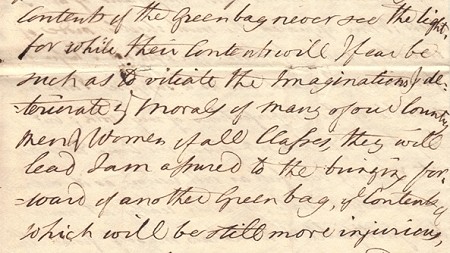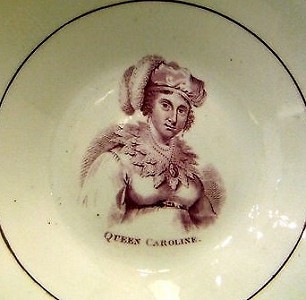William Wilberforce and the Queen Caroline affair

Letter written by Wilberforce

Queen Caroline
In Louth Museum we have letters written by one of my favourite historical figures, the great politician and anti-slavery campaigner William Wilberforce. He was writing to Matthew Lister of Burwell Hall.
In June 1820, Wilberforce wrote, “I hope, & indeed can scarcely doubt, that you will approve of the resolution to which the House of Commons acceded the other night on my motion to put off or prevent further discussion of the unhappy difference between the King and Queen – O may the contents of the green bags never see the light. For while their content will I fear be such as to vitiate the imaginations & determinate the morals of many of your country men and women of all classes, they will lead I am afraid to the bringing forward of another green bag, the contents of which will be still more injurious tending to the extinction of all that respect for royalty itself as well as of reverence and regard for the actual wearer of the crown, which seems so little to abound in the present day, & therefore needs so little any new causes for diminishing it.”
What was the problem between the King and Queen, and what was in the green bags?
In 1795, Prince George (the future King George IV) had reluctantly married his cousin Princess Caroline. Soon after their marriage, George and Caroline began to live separately. After King George III died in January 1820, George wanted to divorce Caroline. He gathered evidence about her adultery, which was stored in sealed green bags, and he put pressure on the government to introduce a bill annul the royal marriage.
The public were engrossed by the scandal. The king was regarded as extravagant and selfish, and many people supported Caroline. By standing up for Caroline, critics were attacking the regime without being openly rebellious. The guards in the King's Mews mutinied, and the government was fearful of further unrest.
Wilberforce was persuaded by his friends to move an adjournment of the debate in the House of Commons ‘to give the common friends of the parties time to effect an amicable reconciliation’. It was reported that Wilberforce ‘spoke most beautifully’. His motion was supported and ultimately agreed without a division.
As a result of Wilberforce’s intervention, the contents of the green bags containing information about Caroline’s infidelities were not made public, and neither was the other green bag that Wilberforce mentioned, which presumably would have described George’s extra-marital affairs.
Nevertheless, when Caroline attempted to enter Westminster Abbey to attend the coronation service in July 1821, the doors were slammed in her face. That night she fell ill, and after a few weeks she died. It was said that she had an intestinal obstruction, but there were rumours that she had been poisoned.